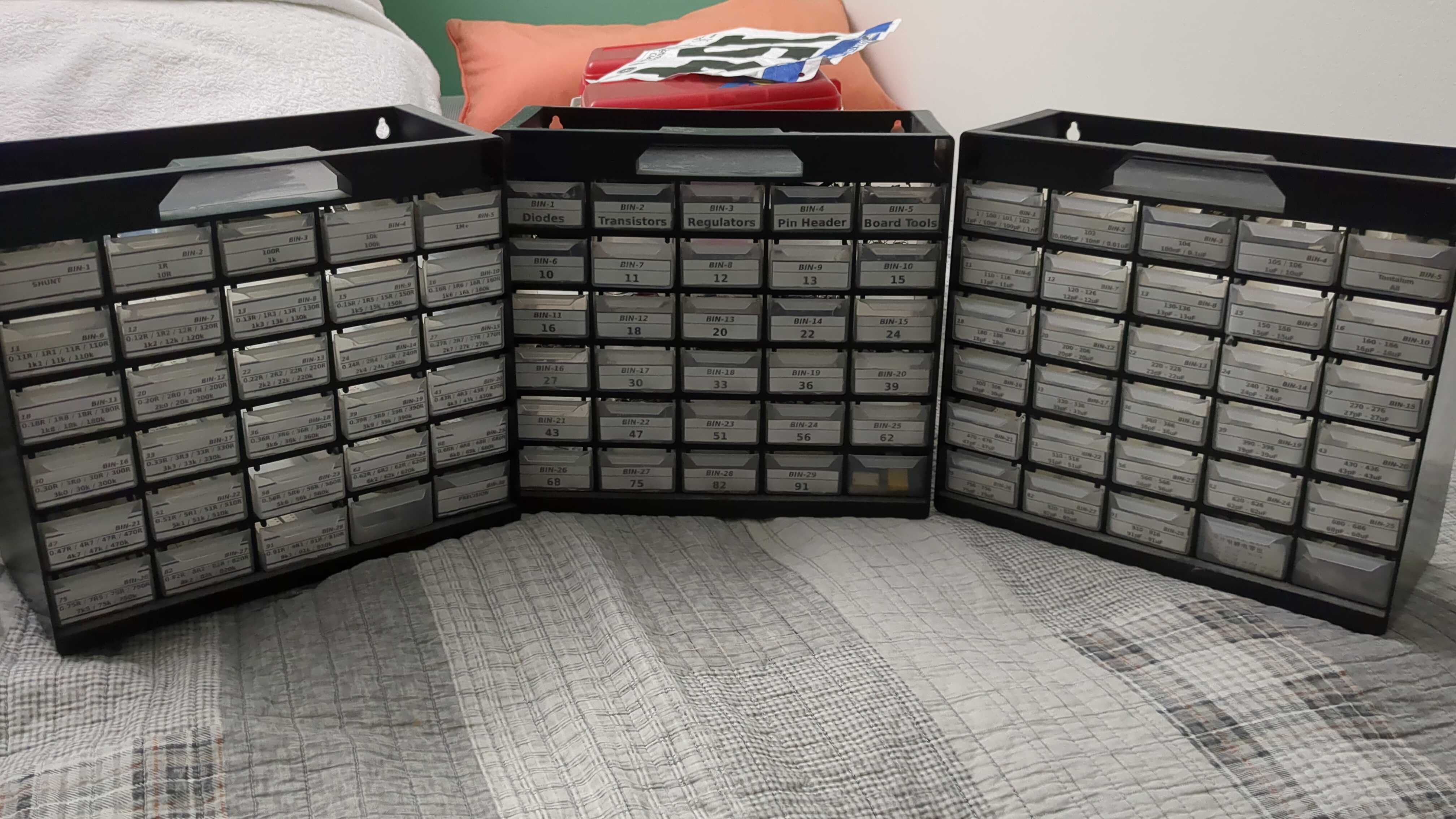Starting to transfer to a spreadsheet instead of my usual paper notebook I list all my electronics in to get a grasp on all my parts (towers, laptops, memory, motherboards, videocards, etc). Lately I’ve been on a kick of labeling all my shelves (medicine, linen, kitchenware) and trying to sort things into random plastic bins I’ve had laying around waiting for a purpose.
I realize I could dive into deep rabbit holes for every category. With electronics I’m thinking of documenting every chip, board, and component along with compatibilities. Pantries and personal goods could be inventoried and auto-reordered, better tracking of my tools and materials with service reminders for equipment, etc etc.
I’ve gone through years where I throw everything away and get rid of anything not used recently and years where I horde everything and anything. Seems moderation in both is key and why keeping it all in mind and documented seems like the right thing to do if you have the time to kill.
tldr, what tips or tricks do you use to keep up with all your shit?
If you need a computer to keep track of it, you have too much crap cluttering your life.
Lol, right, right
it’s not so much needing a computer as I’m trying to transition myself into newer and hopefully more efficient systems of data entry and cataloging. I’ve definitely had to take time to find a notebook I’ve misplaced and I type a lot faster than I write so it just makes sense. Looking at what has a certain type of memory I can pull from something not being used anymore is helpful and just fun in my opinion for brainstorming configurations. The past couple of years I’ve received a bunch of new stuff I need to figure out what I’m doing with it so time to streamline it all.
How about just a text file, or org mode (org-mode.org).
Personally I’ve been trending the opposite direction: getting rid of things. We had our first kid about 7 years ago, which has seriously decreased my time for tinkering. I didn’t realize it at first, so I kept on picking up projects that interested me, got some pieces for them, organized them, and… they’re still there years later. The worst a somewhat sentimental things, that don’t really see much use, and are also projects. For example, I bought the boom box of my youth. It’s from the 80s (it wasn’t new when I had it 25 years ago) and needs some TCL - potentiometers cleaned up, some loose connections run down, etc. It’s low on my list of things to fix because it doesn’t actually sound that great and cant compete with my Bluetooth speaker.
I was at your stage a little over 10 years ago, renting and moving, kids slowly getting more things. Now they’re starting to move out and I’ve purchased a larger run down house that needs to be filled up. There’s some things I regret getting rid of like materials but for the most part I’m happy I don’t have so much to keep track of at the moment. The projects I’ve shelved for some many years are starting to get dusted off again and I’m finally getting back into hobbies and tinkering again. Definitely a good observation on the bluetooth speaker, there’s some things it’s just not worth putting the effort into unless it’s a niche need like a portable cassette player etc. I’m hoping you experience the same thing and get some of that time back in your future to do what you want.
Thanks for the thoughtful reply! I am holding on to some things in hopes of being able to do with the kids when they’re older, but it has been pretty liberating getting rid of some of this stuff.
The only thing I have inventoried is what’s in the attic. Everything is in large plastic totes by category. I keep a text file listing each tote and what’s in each. You looking for something specific? Search for that word in the text file and then go open up tote F3.
The totes are color coded based on what category of item is in them & have their contents written on the lids using a chalkboard marker for anyone in the family who doesn’t want to use the text file.
Sounds easy. Well, straight-forward, at least. For such things i use “zim” (a desktop wiki). Tangibles (like a motherboard) get a page that contains “links” to all the variables and components you want to trak/index (the actual target pages don’t actually have to exist). I would the drop that page in a hierarchy of containers (building, room, box, etc). Then, you can locate the page using any of the backlinks (like, by component), and reference the page path if you actually need to lay hands on it in the future. There is also a search feature, but i like the backlinks.
I am Professor Chaos!
I get rid of what I don’t want or haven’t used in years. No need to track anything.
Nothing wrong with being organized. And knowing where everything is when you need it. But it’s also a ton of work.
I have been packing for moving, so I have every box labeled and in a spread sheet of all contents (with serial numbers) and the size of the box too. It’s helped many times as I keep needing things I already packed.
Spreadsheets are for math. You want a database, specifically an asset management database. Snipe-it for example.
Thank you for the common sense response, it hadn’t clicked but I think this was my problem. The format of the spreadsheet and trying to make it work for my purposes just made me stop everytime I attempted it. This identified my problem I believe and now I can look into other options. As other’s have said, I probably could get it to work for my purposes but learning and understanding all the tools with the program just isn’t worth it for this one singular reason.
Meh, spreadsheets are for whatever you use them for. I use them for a lighter version of project management, where I don’t need all the rules of a project management app because they get in the way.
An .org file which i mainly edit with Orgzly
Build a Second Brain in Emacs with Org Roam
You can use git to sync.
I had a buddy who made a custom Microsoft Access interface to track all the different coffees that they had.
LibreOffice Base would be a reasonable choice if you don’t mind the effort to set it up.
I used to track everything. Now I just keep stuff in regions of my room and know basically where to look. At the same time, I have nearly floor to ceiling drawer cabinets in my room, a closet full of shelves, and a raised bed I made to allow full size plastic totes to fit under. My electronics station is integrated into my bed with a swivel laptop stand that can work in bed or at my desk. For components, everything is organized by E95 log scale with the like number values consolidated. So like one drawer/container might have 0.47, 4.7, 47, 470, 4k7, 47k, 470k, and 4m7.
Could you delve a little more into detail on that numbering system?
Sorry, corrected my mistaken memory. I use E24 log values for organization, AKA 5% values.
Left is surface mount resistors, middle is all of my through hole spare caps and resistors, right are my surface mount capacitors. The numbers are the E24 series. Anything that I have that is an in between value gets into the rounded down value, and I split up the 10’s as shown:

Nice! Thank you for that!
What in the OCD is this? /s
No, but seriously, I use only a spreadsheet for the things I need to track. Is there a proper small scale database solution?
Is there a proper small scale database solution?
Spreadsheets in the office suite of your choice
I’ve been getting around to giving a Grocy a try.
It’s a pretty much an ERP system for the household (Even their tagline is “ERP beyond the fridge”)
It supports a whole bunch of things, the least of which is household inventory tracking and it even has the ability to integrate with a barcode scanner. So you can tie it into like a product API to scan the retailer barcodes or tie it into your own DB for lookup for your own custom barcodes
It’s a bit involved if you’re not into self hosting and servers and such though
Grocy looks really good; thanks for the recommendation. Do you know if it can generate meal plans based on what you have in stock and tell you what you need to get to make particular meals? It looks like they have a ‘desktop’ version for those who don’t want to host it on their server too.
I tried Grocy for a while, but eventually stopped. Data entry was a huge pain.
Using the iOS companion app to scan grocery items into the app resulted in data issues that prevented me updating the item in the web app later. The only recourse was to add the items by hand in the web app, but then go in to each one separately with the mobile app to register the barcode. This also resulted in losing the additional metadata about the products that the mobile app would automatically configure if you onboarded the items through the mobile app, as it was able to look up additional data online and prefill a lot of stuff.
At the end of the day, it was too much of a hassle. I do like the idea, and may come back to Grocy again, but for now I have to pass.
What does ERP stand for besides “Erotic RolePlay”?
Enterprise Resource Planning is the acronym I know. It’s usually used in a company context and is essentially a system that “can do it all” (HR, inventory management, customer relationship management, etc…)
Most people don’t do that. They just have general places to keep track of important things. Most people are far less organised than you.
Some people on here are saying you come across as mentally ill in some way, but I don’t think that’s necessarily true. I would hope you naturally find some sense of joy or fulfillment in keeping track of different types of databases for minor practical benefits. I’m no psychologist though.
sometimes organizing things is a hobby and can ease stress. in your full control and helps calm the mind. not for everyone of course, but I don’t think it’s an illness either.
I’ve got a Shulker farm, so I’m set for space. The trouble is that even after recursively duplicating trillions upon trillions of pens, I still can’t ever find one when I actually need it.







